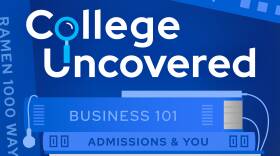College presidents sign letter of ‘moral courage’ and condemn Trump’s actions
Leaders with the American Association of Colleges and Universities call for “constructive engagement” and condemn the Trump administration when it comes to higher education.
Podcast: College Uncovered
-
S4 Eps 3 The Missing Men
Something has been happening on college campuses that’s as surprising as it is dramatic: The number of women enrolled has overtaken the number of men.Women now outnumber men by about 60 percent to 40 percent, and that gap keeps getting wider. And men who do enroll are also more likely to drop out.There are a lot of reasons for this. Boys get lower grades than girls, on average, in elementary and middle schools. They’re more likely to be held back or face disciplinary actions. They’re less likely to graduate from high school. And more men than women go into the skilled trades, instead of getting college degrees.Among the results: Universities and colleges now tip the scales for men in admission to try to keep the genders even.But as things keep falling out of balance, there are impacts on the financial success for men and on economic growth for everybody.We’ll hear from men and women students about what that’s like right now, and from colleges about what they’re trying to do about it. -
S4 Eps 2 “Tag, You’re In!” – The Rise of Direct Admissions
The anxiety-inducing college admissions game is changing – what if colleges started applying to you instead of the other way around? With declining birth rates and growing skepticism about the value of a degree, higher education is facing an enrollment cliff, set to hit hard in 2026. That’s 18 years after the Great Recession when many American families stopped having babies. As competition for students intensifies, more states desperate for workforce talent and schools dependent on tuition dollars are turning to direct admissions – a system where students receive college acceptance offers and scholarships before they even apply.In this episode, hosts Kirk Carapezza and Jon Marcus break down how we got to this point where the college admission process requires students to spend a ton of time and money with no guarantee of success. And they ask whether direct admissions is the solution colleges and students need – or just a Band-Aid on a bigger enrollment crisis. -
S4 Eps 1 The Demographic Cliff
Most Americans would probably rather forget the Great Recession that began in 2007. But as long ago as it may seem, it triggered something that is about to become a big problem: Americans started having fewer babies, and the birth rate hasn’t recovered since. That means a looming decline in the number of 18-year-olds. Since those are the traditional customers for universities and colleges, enrollment is projected to fall dramatically and campuses to close. In this episode, we tell you the surprising benefits of this for students and their parents — and the scary prospects for the economy, which will suffer shortages of workers just as baby boomers retire. Come with us to a college fair where recruiters line up to compete for applicants, and hear from enrollment consultants, economists, and the president of a school that has already closed. -
Introducing College Uncovered: Season 4 – The Demographic Cliff
College Uncovered Season 4 is coming! The first two episodes drop Thursday, April 17th. This season, we’re standing on the precipice of a “demographic cliff” threatening higher education. A drop in the number of 18-year-olds that are alive right now – triggered by a decline in birth rates after the 2008 Great Recession – is forcing colleges to rethink everything. Schools across the country are changing admissions, restructuring financial aid, rebranding the humanities, and finding new ways to recruit and educate young men, whose numbers are dropping even more precipitously on many campuses. We’ll uncover how these changes affect students, families, higher education, the economy, and our society at largeCollege Uncovered is hosted by Kirk Carapezza and Jon Marcus, two skilled multimedia journalists with decades of experience in covering higher education in the United States. They offer students, their families, and anyone curious about the business of college, an unvarnished look at a uniquely American system – and help you make better informed choices. New episodes of College Uncovered drop each week through May and are available wherever you listen to podcasts. -
S3 Ep 7 Abortion on the ballot … and in the mail
Greater Boston – a region famous for its sheer number of colleges – is also home to an underground network that helps women receive abortion pills. Every week, a group including many Boston-area college and medical students meets to put together abortion pill care packages to send to women who need them.













